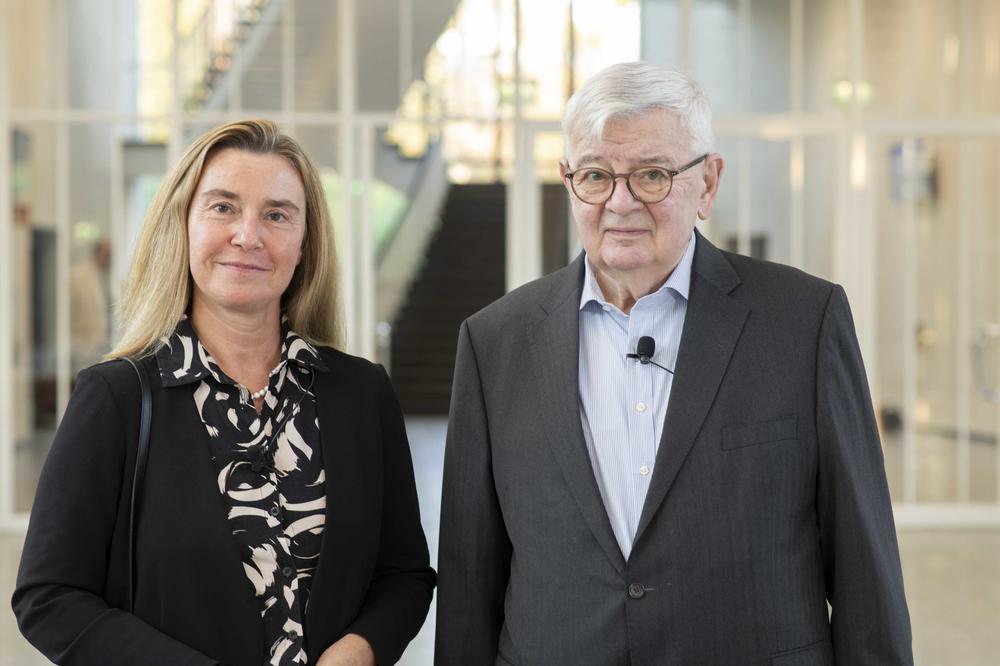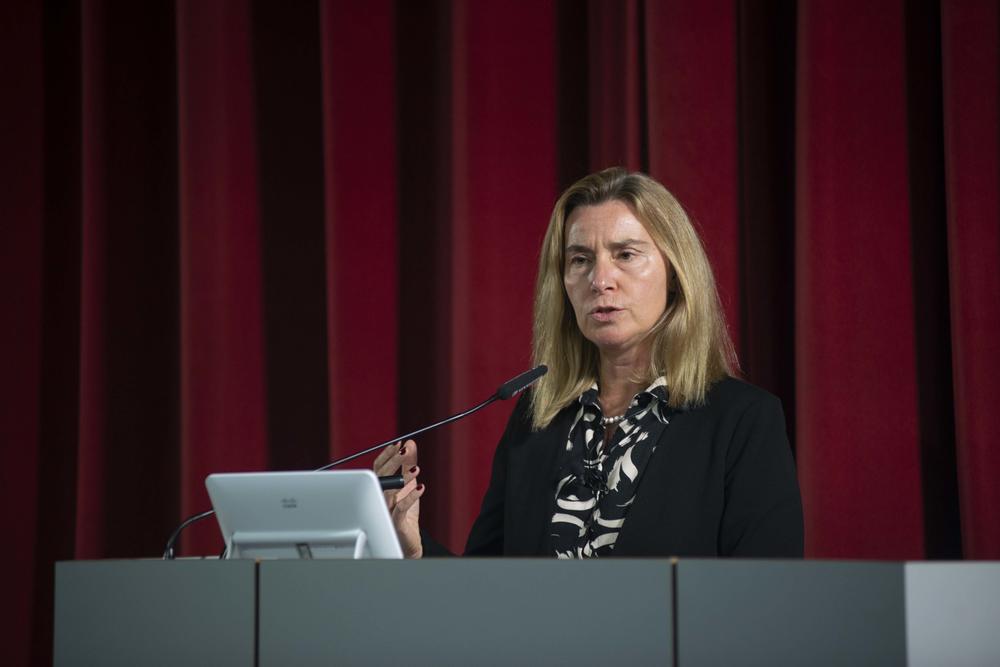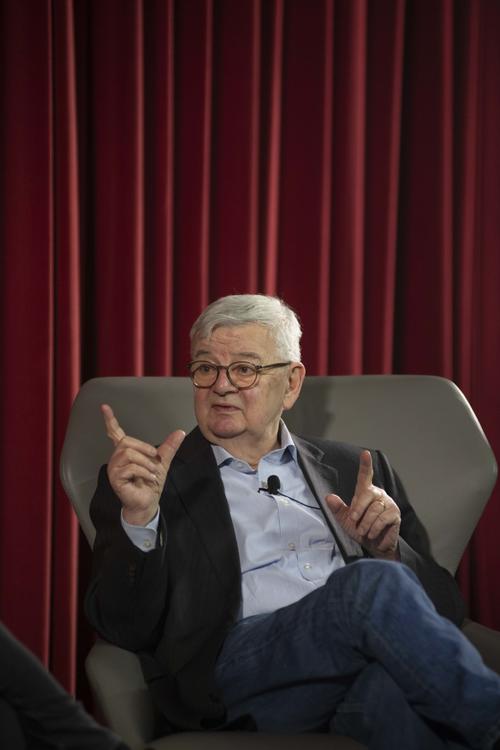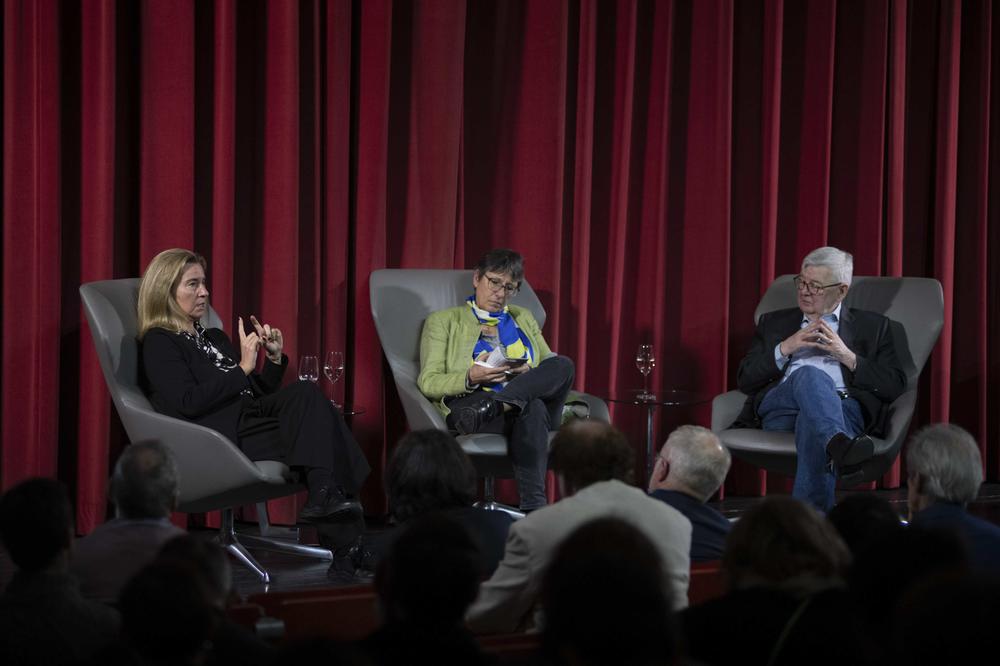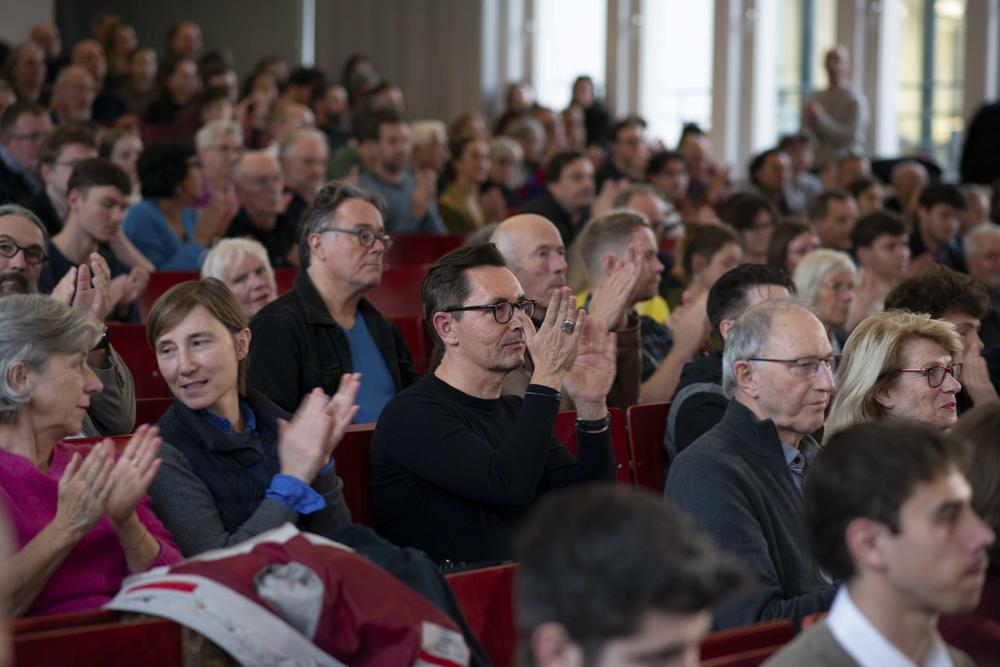“The New Global Disorder: Europe’s Future in a Fracturing World”
Federica Mogherini and Joschka Fischer discussed the end of multilateralism and the weaknesses of the European Union at Freie Universität Berlin
Nov 20, 2025
Federica Mogherini and Joschka Fischer held the first Europaeum Annual Lecture on November 7, 2025, at the Henry Ford Building at Freie Universität Berlin.
Image Credit: Gareth Harmer
The former High Representative of the Union for Foreign Affairs and Security Policy Federica Mogherini and former German Foreign Minister Joschka Fischer debated the future of Europe over the course of the first Europaeum Annual Lecture at Freie Universität Berlin. In Mogherini’s lecture, “The New Global Disorder: Europe’s Future in a Fracturing World,” she delivered a sober prognosis that took the form of a wake-up call to the European Union. The Europaeum Annual Lecture is a new event series organized by Europaeum, a network of seventeen universities led by Oxford University. Freie Universität Berlin joined the network in 2019. Tanja Börzel, professor of political science at Freie Universität Berlin, moderated the event, while Vice President Petra Knaus held the welcome address.
During his time as a political prisoner of the Italian fascists, philosopher Antonio Gramsci noted in his Prison Notebooks that we needed “sober, patient people who do not despair in the face of the worst horrors,” in addition to his most famous dictum: “pessimism of the intellect, optimism of the will.”
The inaugural Europaeum Annual Lecture, held by former Italian Foreign Minister and EU High Representative for Foreign Affairs and Security Policy Federica Mogherini, took place at Freie Universität on November 7, 2025. The lecture was followed by a discussion between Mogherini and Joschka Fischer, Germany’s former Federal Foreign Minister and Vice Chancellor. Gramsci would have been proud: The event was an exercise in sobriety in the face of horror, and in the pessimism of the intellect. You might even say that it was an exercise in the pessimism of experience. When it came to optimism of the will, however, both parties restrained themselves somewhat. While the occasional positive remark was made, the overall mood remained subdued.
Federica Mogherini, Rector of the College of Europe (Bruges) was invited to hold the first Europaeum Annual Lecture. The lecture, titled “The New Global Disorder: Europe’s Future in a Fracturing World,” was followed by a discussion between Mogherini and Fischer.
Not much cause for optimism: Federica Mogherini was the EU High Representative for Foreign Affairs and Security Policy from 2014–2019.
Image Credit: Gareth Harmer
In her lecture, Mogherini emphasized that, though she is an optimist by nature, the current situation is making it increasingly harder for her to stay positive. She says that it is difficult not to get caught up in the snowball effect of one crisis seemingly following another: the financial crisis which continues to impact our lives, the ever-present threat of the climate crisis, the growing displacement of people across the world, Covid-19 (not the last pandemic we will experience), and two geopolitical crises that are currently threatening the global order – Donald Trump’s presidency and Russia’s war of aggression against Ukraine.
Mogherini admitted that these crises are nothing new; Europe has borne witness to many bloody and horrific wars in the past – as recently as the Yugoslav Wars from 1991‒2001. However, two factors lead her to believe that the current war in Ukraine is different. Firstly, it was started by a permanent member of the UN Security Council, an organ of the United Nations tasked with ensuring international peace and security. Secondly, the war was declared by Russia for the purpose of shifting national borders and revising history to fit a certain narrative.
As a result, she believes that this is not only an attack on Ukraine, or on peace in Europe, but on the liberal international order itself. Faced with the question of whether this conflict might encourage the USA or other members of the UN Security Council to declare wars in pursuit of their own ends, Mogherini allowed for the possibility, but argued that the USA would not have tried to subjugate its neighboring states. It would have at least tried to maintain a semblance of international legitimacy, according to her.
Joschka Fischer, Germany’s Federal Foreign Minister and Vice Chancellor from 1998‒2005, has a bleak view of the current global situation and takes a critical stance toward the European Union.
Image Credit: Gareth Harmer
The real reason that Mogherini gives for her pessimism is not the global challenges and crises themselves, but rather the fact that the institutions and mechanisms that could provide answers to these global challenges and crises are being threatened and destroyed.
She feels that this development is being compounded by the fact that the global, rules-based order of the multilateral system is not simply deteriorating, it is being deliberately vilified and dismantled by politicians in the White House and the Kremlin. Mogherini claims that it is not only multilateralism, i.e., the rules-based order, that is under threat, but also the institutions that attempt to maintain it – for example, the European Union.
According to Mogherini, we should view the current situation as a fight for the global order; namely, a fight between those who subscribe to the idea of “the survival of the fittest,” and those who want to save the global, rules-based order of the multilateral system.
When viewed from this perspective, it is not hard to see where Mogherini’s pessimism comes from. She did, however, leave some room for optimism, mentioning that the EU has proven itself multiple times in times of crisis. For example, during the Covid-19 pandemic, when the EU achieved that which had previously seemed impossible – like the development of a vaccine and an economic recovery package – in a matter of weeks.
Joschka Fischer: “I agree with you, but I think you are being too optimistic”
Professor Tanja Börzel (center) moderated the discussion between Federica Mogherini and Joschka Fischer.
Image Credit: Gareth Harmer
Following the Brexit referendum in 2016, many believed the EU was on its last legs. However, it rose to the occasion and proved itself to be more powerful than expected. This is why Mogherini continues to believe in the EU today, although she acknowledges that more needs to be done with regard to defense.
She then proceeded to outline several pieces of advice for the EU. Firstly, it needs to prepare itself for the worst-case scenario, namely to invest in its own security and defense. Secondly, it needs to implement the proposals set out in the Draghi report to improve its economic competitiveness. It also needs to take steps to ensure strategic autonomy in areas such as chip production or artificial intelligence, and reduce its dependence on states such as the United States or China. Thirdly, the EU needs to build resilient societies and counter disinformation.
Then it was former German Foreign Minister Joschka Fischer’s turn to respond. Reflecting on Mogherini’s lucid yet somber remarks, he said, “I agree with you, but I think you are being too optimistic.”
Fischer sees a number of pressures that Europe must face up to, both geopolitical and climate crisis-related. At the same time, it will have to reckon with some huge economic challenges. For example, China is well on its way to becoming an economic superpower that is fast outpacing Europe. At the same time, European dependence on China is only continuing to grow. Progress being made in big tech in the United States is also outstripping European capabilities, meaning that Europe is increasingly falling behind when it comes to technology, trade, and the economy.
Well attended: The inaugural Europaeum Annual Lecture, held in the Henry Ford Building at Freie Universität Berlin, met with great interest.
Image Credit: Gareth Harmer
Fischer shares Mogherini’s pessimism when it comes to the future of Europe. However, he takes things one step further and has an even more disillusioned view. He claims that Europe is divided – unable to find a common political answer or to develop its own geopolitical vision for the future. Fischer also points out that Mogherini did not address the issue of nationalism in Europe in her lecture. Noting that the next French presidential elections could see the far right come to power, Fischer voiced concern that this would damage relations between France and Germany, dealing the final blow to the European Union.
He further emphasized that the old order will not come back, and that the United States can no longer be relied upon as “our protector and our friend.” “Let’s face it,” he says, “we are alone, and Europeans are definitely not up to the challenge.” Reflecting on present-day Europe, he says, with some irony, that Europe is rich, weak, and old, warning that this is a dangerous combination. Fischer notes that Europe needs to defend its values, even when it is isolated and lacks the power to do so. He concedes, however, that power requires unity – something that Europe is currently lacking.
Adding to his pessimistic prognosis, Fischer admitted that he does not expect a great deal from the current German government and its chancellor. In any case, he does not see the kind of pioneering spirit represented in our current leaders – neither on the European level nor on a broader international level – that would be necessary to reform the global order.
At this point, Federica Mogherini intervened to inject a hint of optimism back into the conversation, claiming that the old global order is history because its rules no longer applied to the existing power structures. In her eyes, this just means that we are now required to create and negotiate a new order. She sees potential for partners in this new order to be found beyond Washington or Moscow, for example, in the Global South. She even sees the possibility of China, as an upcoming global superpower, wanting to have a say in how the rules of global governance are rewritten – in a peaceful, collaborative manner.
In these times of unrest and transition, Gramsci can be relied upon to deliver a succinct summary of the current global situation, as applicable now as it was back then, “The old world is dying and the new world struggles to be born. Now is the time of monsters.”
The original German version of this article appeared in campus.leben, the online magazine published by Freie Universität Berlin.

